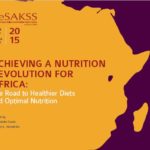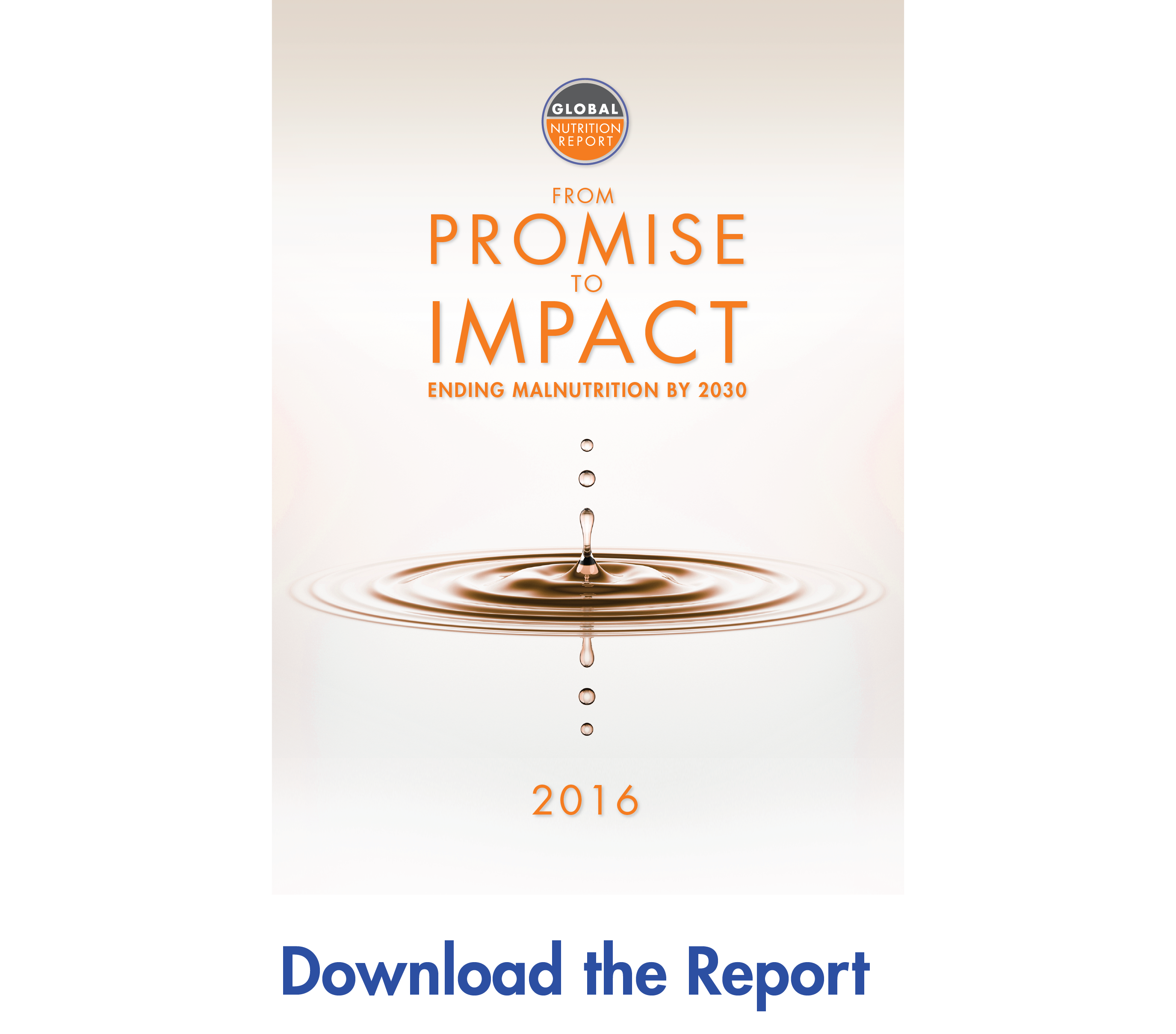 18–20 October, 2016. Accra, Ghana. The International Food Policy Research Institute (IFPRI), in partnership with the African Union Commission (AUC), convened the 2016 ReSAKSS Annual Conference to promote review and dialogue on the Comprehensive Africa Agriculture Development Programme (CAADP) implementation agenda among state and nonstate actors.
18–20 October, 2016. Accra, Ghana. The International Food Policy Research Institute (IFPRI), in partnership with the African Union Commission (AUC), convened the 2016 ReSAKSS Annual Conference to promote review and dialogue on the Comprehensive Africa Agriculture Development Programme (CAADP) implementation agenda among state and nonstate actors.
This year’s conference centered on nutrition, an area that has gained increasing attention and momentum across Africa. Recent AUC initiatives include:

(FAO), and other development partners—to mainstream nutrition in national agriculture and food security investment plans.
The conference allowed policymakers, researchers, advocacy groups, farmers’ organizations, the private sector, development partners, and other key stakeholders from within and outside of Africa to
Keynote Address: Scaling Up Nutrition Action for Africa: Where Are We and What Challenges Need To Be Addressed To Accelerate Momentum, Lawrence Haddad, Executive Director, Global Alliance for Nutrition (GAIN), United Kingdom.
The Role of Mycotoxin Contamination on Nutrition: The Aflatoxin Story. Amare Ayalew, Program Manager, Partnership for Aflatoxin Control in Africa (PACA), Ethiopia
Role of Biofortification as Part of a More Diverse Diet in Africa: Progress, Challenges and Opportunities, Bho Mudyahoto, Senior Monitoring, Learning and Evaluation Specialist, Harvest Plus, Uganda.
 ACHIEVING A NUTRITIONREVOLUTION FORAFRICA:The Road to Healthier Dietsand Optimal Nutrition. (October 2016, 282 pages)
ACHIEVING A NUTRITIONREVOLUTION FORAFRICA:The Road to Healthier Dietsand Optimal Nutrition. (October 2016, 282 pages)
 The Global Nutrition Report (June 2016, 180 pages) is an independent and comprehensive annual review of the state of the world’s nutrition.
The Global Nutrition Report (June 2016, 180 pages) is an independent and comprehensive annual review of the state of the world’s nutrition.
It is a multipartner initiative that holds a mirror up to our successes and failures at meeting intergovernmental nutrition targets. It documents progress on commitments made on the global stage, and it recommends actions to accelerate that progress. The Global Nutrition Report aims to be a beacon, providing examples of change and identifying opportunities for action. This year’s report focuses on the theme of making—and measuring— SMART commitments to nutrition and identifying what it will take to end malnutrition in all its forms by 2030.
The 2016 Report was funded through the support of the Bill & Melinda Gates Foundation, the CGIAR Research Program on Agriculture for Nutrition & Health, the Children’s Investment Fund Foundation, the European Commission, the Governments of Canada, Germany, and the Netherlands, Irish Aid, UK Department for International Development (DFID), US Agency for International Development (USAID), and 1,000 Days.
The Report is delivered by an Independent Expert Group and guided at a strategic level by aStakeholder Group, whose members also reviewed the Report. The International Food Policy Research Institute (IFPRI) oversees the production and dissemination of the Report, with the support of a virtual Secretariat.
6 October 2016. Washington DC. Keynote Address by Kanayo Nwanze (IFAD) at the IFPRI Special Event, “Accelerating Progress in Ending Hunger and Undernutrition”
In the keynote address, Kanayo Nwanze, President of the International Fund for Agricultural Development (IFAD), highlighted the “cruel paradox” that many families that feed the world on small farms are the ones who go hungry. He raised key questions for national governments and development organizations to consider as they seek to scale up interventions to end hunger: “Are we paying enough attention to smallholders? Are we engaging them in finding solutions to end hunger and undernutrition? And if not, why not?”
Source: PAEPARD FEED
by secretary
by secretary
by secretary
by secretary
by secretary
by secretary
by secretary
by secretary
by secretary
by secretary
by secretary
by secretary
by secretary
by secretary
by secretary
by secretary
by secretary
by secretary
by secretary
by secretary
by secretary
by secretary
by secretary
by secretary
by secretary
by secretary
by secretary
by secretary
by secretary
by secretary
by secretary
by secretary
by secretary
by secretary
by secretary
by secretary
by secretary
by secretary
by secretary
by secretary
by secretary
by secretary
by secretary
by secretary
by secretary
by secretary
by secretary
by secretary
by secretary
by secretary
by secretary
by secretary
by secretary
by secretary
by secretary
by secretary
by secretary
by secretary
by secretary
by secretary
by secretary
by secretary
by secretary
by secretary
by secretary
by secretary
by secretary
by secretary
by secretary
by secretary
by secretary
by secretary
by secretary
by secretary
by secretary
by secretary
by secretary
by secretary
by secretary
by secretary
by secretary
by secretary
by secretary
by secretary
by secretary
by secretary
by secretary
by secretary
by secretary
by secretary
by secretary
by secretary
by secretary
by secretary
by secretary
by secretary
by secretary
by secretary
by secretary
by secretary
by secretary
by secretary
by secretary
by secretary
by secretary
by secretary
by secretary
by secretary
by secretary
by secretary
by secretary
by secretary
by secretary
by secretary
by secretary
by secretary
by secretary
by secretary
by secretary
by secretary
by secretary
by secretary
by secretary
by secretary
by secretary
by secretary
by secretary
by secretary
by secretary
by secretary
by secretary
by secretary
by secretary
by secretary
by secretary
by secretary
by secretary
by secretary
by secretary
by secretary
by secretary
by secretary
by secretary
by secretary
by secretary
by secretary
by secretary
by secretary
by secretary
by secretary
by secretary
by secretary
by secretary
by secretary
by secretary
by secretary
by secretary
by secretary
by secretary
by secretary
by secretary
by secretary
by secretary
by secretary
by secretary
by secretary
by secretary
by secretary
by secretary
by secretary
by secretary
by secretary
by secretary
by secretary
by secretary
by secretary
by secretary
by secretary
by secretary
by secretary
by secretary
by secretary
by secretary
by secretary
by secretary
by secretary
by secretary
by secretary
by secretary
by secretary
by secretary
by secretary
by secretary
by secretary
by secretary
by secretary
by secretary
by secretary
by secretary
by secretary
by secretary
by secretary
by secretary
by secretary
by secretary
by secretary
by secretary
by secretary
by secretary
by secretary
by secretary
by secretary
by secretary
by secretary
by secretary
by secretary
by secretary
by secretary
by secretary
by secretary
by secretary
by secretary
by secretary
by secretary
by secretary
by secretary
by secretary
by secretary
by secretary
by secretary
by secretary
by secretary
by secretary
by secretary
by secretary
by secretary
by secretary
by secretary
by secretary
by secretary
by secretary
by secretary
by secretary
by secretary
by secretary
by secretary
by secretary
by secretary
by secretary
by secretary
by secretary
by secretary
by secretary
by secretary
by secretary
by secretary
by secretary
by secretary
by secretary
by secretary
by secretary
by secretary
by secretary
by secretary
by secretary
by secretary
by secretary
by secretary
by secretary
by secretary
by secretary
by secretary
by secretary
by secretary
by secretary
by secretary
by secretary
by secretary
by secretary
by secretary
by secretary
by secretary
by secretary
by secretary
by secretary
by secretary
by secretary
by secretary
by secretary
by secretary
by secretary
by secretary
by secretary
by secretary
by secretary
by secretary
by secretary
by secretary
by secretary
by secretary
by secretary
by secretary
by secretary
by secretary
by secretary
by secretary
by secretary
by secretary
by secretary
by secretary
by secretary
by secretary
by secretary
by secretary
by secretary
by secretary
by secretary
by secretary
by secretary
by secretary
by secretary
by secretary
by secretary
by secretary
by secretary
by secretary
by secretary
by secretary
by secretary
by secretary
by secretary
by secretary
by secretary
by secretary
by secretary
by secretary
by secretary
by secretary
by secretary
by secretary
by secretary
by secretary
by secretary
by secretary
by secretary
by secretary
by secretary
by secretary
by secretary
by secretary
by secretary
by secretary
by secretary
by secretary
by secretary
by secretary
by secretary
by secretary
by secretary
by secretary
by secretary
by secretary
by secretary
by secretary
by secretary
by secretary
by secretary
by secretary
by secretary
by secretary
by secretary
by secretary
by secretary
by secretary
by secretary
by secretary
by secretary
by secretary
by secretary
by secretary
by secretary
by secretary
by secretary
by secretary
by secretary
by secretary
by secretary
by secretary
by secretary
by secretary
by secretary
by secretary
by secretary
by secretary
by secretary
by secretary
by secretary
by secretary
by secretary
by secretary
by secretary
by secretary
by secretary
by secretary
by secretary
by secretary
by secretary
by secretary
by secretary
by secretary
by secretary
by secretary
by secretary
by secretary
by secretary
by secretary
by secretary
by secretary
by secretary
by secretary
by secretary
by secretary
by secretary
by secretary
by secretary
by secretary
by secretary
by secretary
by secretary
by secretary
by secretary
by secretary
by secretary
by secretary
by secretary
by secretary
by secretary
by secretary
by secretary
by secretary
by secretary
by secretary
by secretary
by secretary
by secretary
by secretary
by secretary
by secretary
by secretary
by secretary
by secretary
by secretary
by secretary
by secretary
by secretary
by secretary
by secretary
by secretary
by secretary
by secretary
by secretary
by secretary
by secretary
by secretary
by secretary
by secretary
by secretary
by secretary
by secretary
by secretary
by secretary
by secretary
by secretary
by secretary
by secretary
by secretary
by secretary
by secretary
by secretary
by secretary
by secretary
by secretary
by secretary
by secretary
by secretary
by secretary
by secretary
by secretary
by secretary
by secretary
by secretary
by secretary
by secretary
by secretary
by secretary
by secretary
by secretary
by secretary
by secretary
by secretary
by secretary
by secretary
by secretary
by secretary
by secretary
by secretary
by secretary
by secretary
by secretary
by secretary
by secretary
by secretary
by secretary
by secretary
by secretary
by secretary
by secretary
by secretary
by secretary
by secretary
by secretary
by secretary
by secretary
by secretary
by secretary
by secretary
by secretary
by secretary
by secretary
by secretary
by secretary
by secretary
by secretary
by secretary
by secretary
by secretary
by secretary
by secretary
by secretary
by secretary
by secretary
by secretary
by secretary
by secretary
by secretary
by secretary
by secretary
by secretary
by secretary
by secretary
by secretary
by secretary
by secretary
by secretary
by secretary
by secretary
by secretary
by secretary
by secretary
by secretary
by secretary
by secretary
by secretary
by secretary
by secretary
by secretary
by secretary
by secretary
by secretary
by secretary
by secretary
by secretary
by secretary
by secretary
by secretary
by secretary
by secretary
by secretary
by secretary
by secretary
by secretary
by secretary
by secretary
by secretary
by secretary
by secretary
by secretary
by secretary
by secretary
by secretary
by secretary
by secretary
by secretary
by secretary
by secretary
by secretary
by secretary
by secretary
by secretary
by secretary
by secretary
by secretary
by secretary
by secretary
by secretary
by secretary
by secretary
by secretary
by secretary
by secretary
by secretary
by secretary
by secretary
by secretary
by secretary
by secretary
by secretary
by secretary
by secretary
by secretary
by secretary
by secretary
by secretary
by secretary
by secretary
by secretary
by secretary
by secretary
by secretary
by secretary
by secretary
by secretary
by secretary
by secretary
by secretary
by secretary
by secretary
by secretary
by secretary
by secretary
by secretary
by secretary
by secretary
by secretary
by secretary
by secretary
by secretary
by secretary
by secretary
by secretary
by secretary
by secretary
by secretary
by secretary
by secretary
by secretary
by secretary
by secretary
by secretary
by secretary
by secretary
by secretary
by secretary
by secretary
by secretary
by secretary
by secretary
by secretary
by secretary
by secretary
by secretary
by secretary
by secretary
by secretary
by secretary
by secretary
by secretary
by secretary
by secretary
by secretary
by admin
by admin
by admin
by admin
by admin
by admin
by admin
by admin
by admin

